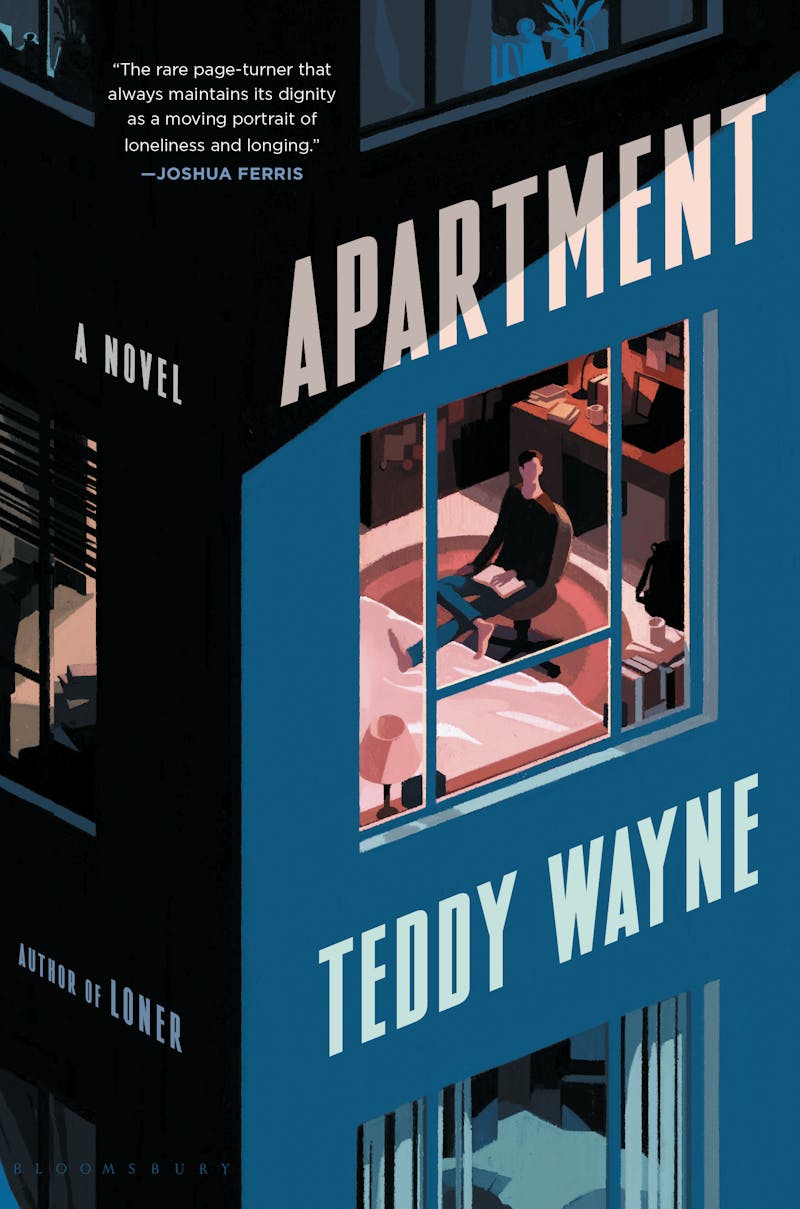Years ago, my husband and I were seated at a restaurant beside two other men. They didn’t seem to be a couple (gays can usually tell), or brothers, or colleagues; they ate in companionable enough near-silence, then departed. My husband leaned across the table and said, “I just don’t know why one man would be friends with another man.”
It was only a joke, acknowledging the fact that intimacy between men is such a rarity in American culture. The best jokes make you laugh and feel sad all at once, and that’s how I felt in that moment. It also describes my response to Teddy Wayne’s fourth novel, Apartment, which takes on the subject of male friendship—and indeed, quite a bit more.

It’s 1996: “An edgeless era of global-super-power peace and American prosperity, sandwiched between the triumphant and calamitous falls of the Berlin Wall and the World Trade Center,” Wayne writes. We’re in New York City. The nameless narrator has begun graduate school at Columbia after a couple of years freelancing and working on a novel. The secret isn’t a trust fund, but a great-aunt’s rent-stabilized StuyTown apartment, which he’s occupying solo, in violation of the lease.
His first day in workshop is brutal. “The main character’s not really someone I want to root for,” one classmate says. “He comes off like an upper-middle-class whiner,” offers another. Wayne is having fun, warning us off the book we’ve just begun reading, but this is more than yet another novel of a writer’s apprenticeship and self-discovery. The narrator’s sole defender in workshop is a student named Billy.
His face was framed by black hair that fell in low-amplitude waves to his jaw, at which point its ends curled up like old parchment.… A strong scent from Billy’s body overpowered the bar’s fried finger food and spilled beer. The primary layer was the smoker’s tobacco aura, but under that lurked the nautical astringency of Old Spice deodorant, which I had long associated with my father.
The narrator is an NYU alum from the Boston burbs; Billy is a community college guy from a small town in Illinois. Our narrator’s work isn’t well received, but Billy’s? “I found myself underlining and checkmarking nearly all the sentences, stark and Spartan but shot through with painterly metaphors and images.” The narrator’s father sends him money, while Billy bartends at an East Village dive. When the narrator discovers that Billy also lives there, he insists that his classmate sleep over.
They’re only pals, but: “A first sleepover, whether it was sexual or platonic, had a way of making you both more and less comfortable around the other person; you’d jumped a fence of intimacy, but now you saw each other in the blunt morning light.” The morning after, things feel real. They’re now comrades in art, and the narrator urges Billy to move in, doing Woolf one better with a two-bedroom of one’s own.
Instead of giving the narrator money—“I didn’t want to render my offer coldly transactional and turn into his landlord, especially when I wasn’t paying rent myself”—Billy will clean and occasionally cook in exchange for a place to stay.
It’s hard to say who gets more out of this arrangement: Billy with a free pad or the narrator with a wingman, a role model, an inspiration. “I wondered if Billy understood how handsome he was, and if that was the innate source of his confidence around women, or if he wasn’t fully aware of it as he seemed not to be about his writing talent.”
The two young men grow closer. To quote Jerry Seinfeld: Not that there’s anything wrong with that! While he appreciates his roommate’s beauty, the narrator’s desire for Billy isn’t sexual but covetous:
I’d seen his bare torso as he went into and out of the shower at home, but not up close. He had a broad chest with a black knot of hair at the sternum, and would have looked at home standing over a sink in a shaving cream commercial, marveling over the smoothness of his cheeks. I’d watched part of The Silence of the Lambs while channel surfing earlier that week, and Buffalo Bill’s attempts to create a bodysuit of female skin inspired a brief, less gruesome mental scenario in which I somehow wore Billy’s body like an exoskeleton, moving through the world in his impervious chassis.
The novel of female friendship often probes the collision of affection and envy. It’s such fertile psychological territory that I can’t answer why the novel of friendship between men is comparatively a rarity, save that such friendships are themselves rare. Apartment doesn’t say, exactly, why this might be, but Wayne has a good time with the contradictions: our animal interest in the body versus heterosexuality’s fear of the homoerotic, our predisposition for emotional interdependence versus the masculine ideal of the rugged individual.
Worth saying, though, that the novel didn’t strike me as a device for metaphor, a strategy to make some point. When the relationship between the two men begins to fray, you wonder if this won’t turn into a thriller—it’s so easy to imagine masculine feeling sublimated into violence! Wayne doesn’t give us crime, but the passion beneath it; that’s far more surprising, and makes for a much more difficult book.
I’m dancing around the specifics because there’s a pleasure to Apartment that it would be unfair to spoil. It’s an enjoyable read (a taut story that the author bravely sees through to its inevitable end) with some insight into the strange condition of manhood: “I suppose each experience like this, just like everyone’s loneliness, feels uniquely uncategorizable—the particular contours of another person’s borders that collide with your own before leaving behind a crater that will be there the rest of your life.” Friends forever indeed.
